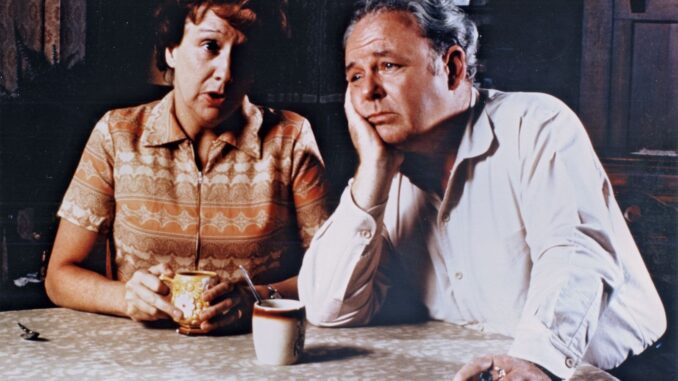
A Show That Redefined Television
If there’s one sitcom that pushed boundaries like no other, it’s All in the Family. Long before modern TV tackled taboo subjects, this groundbreaking series took on politics, racism, gender, religion, war, and cultural change with fearlessness. Naturally, that meant some episodes were so bold they stirred national conversations—and in some cases, outrage.
So which episodes were the most controversial? Let’s break them down.
The Legacy of Controversy in All in the Family
Why the Show Continues to Spark Heated Conversations
All in the Family didn’t just entertain—it provoked. The writers used humor and uncomfortable truths to expose social prejudices. As a result, some episodes shocked audiences and even drew complaints from viewers and organizations across the country.
What Made These Episodes So Provocative?
The show tackled things Americans weren’t used to hearing in prime time:
-
Racial tension
-
Sexual assault
-
Gender roles
-
Politics
-
Generational conflict
-
LGBTQ+ issues
Each episode forced audiences to see their own beliefs reflected—and sometimes challenged—on screen.
The Most Controversial Episodes Ranked
“Sammy’s Visit” — A Groundbreaking Clash
Why It Shocked Viewers
This episode featured the legendary Sammy Davis Jr., and it included one of TV’s most iconic moments: Sammy kissing Archie Bunker on the cheek.
For 1972, this playful gesture—between a Black celebrity and a white conservative character—was monumental.
The Episode’s Deeper Message
The comedy exposed racial stereotypes while highlighting the absurdity of Archie’s biases. Audiences were left laughing, uncomfortable, and thinking all at the same time.
“Edith’s 50th Birthday” — A Sitcom Tackles Trauma

The Most Serious Episode in the Series
This episode centered on an attempted sexual assault against Edith, turning a normally light character into the victim of a terrifying situation.
Viewers had never seen something like this on a sitcom.
Why It Remains Controversial
The storyline forced audiences to confront violence that women often face—something TV avoided at the time. It sparked debates about whether sitcoms should handle such dark themes.
“The Draft Dodger” — Politics, War, and Moral Conflict
A Nation Divided in One Living Room
This episode aired during the height of debate about the Vietnam War. Archie invited both a draft dodger and the father of a soldier who died in the war to Christmas dinner.
Tension exploded.
The Message That Hit Home
It was raw, emotional, and honest—showing how political conflicts fractured American families.
“Judging Books by Covers” — A Bold Take on Homophobia
One of the First TV Episodes to Discuss Sexual Orientation
Archie makes assumptions about a friend of Mike’s based on stereotypes, only to learn he’s wrong. Meanwhile, Archie’s own friend—who fits Archie’s idea of masculinity—is revealed to be gay.
Why It Was Revolutionary
This episode challenged viewers’ preconceived notions at a time when LGBTQ+ topics were almost entirely absent from television.
“Lionel Moves Into the Neighborhood” — Race and Community Tension
A Story That Reflected Real American Neighborhoods
This episode highlighted fears about racial integration and interracial friendships, things many communities struggled with in the 1970s.
The Episode’s Impact
It exposed how racism can hide behind “concerns” about property values or “tradition,” a message still relevant today.
“Archie Is Branded” — Hatred in the Suburbs
The Show Takes on Extremism
After a swastika is painted on a neighbor’s door, Archie becomes involved in a tense situation involving hate groups.
The Message Viewers Weren’t Expecting
The storyline was unusually dark, confronting audiences with the reality of extremist violence in American communities.
“Gloria Has an Affair” — Breaking Sitcom Marriage Rules
A Storyline That Felt Too Real
Infidelity wasn’t something sitcoms addressed in serious tones, especially not involving main characters. The emotional fallout shocked viewers.
Why It Was Controversial
It touched on marital dissatisfaction, independence, and feminine identity—topics thought to be too “adult” for TV.
Themes These Episodes Had in Common
They Challenged Social Norms
Each episode forced audiences to rethink the views they thought were “normal.”
They Mixed Humor With Hard Truths
The show used comedy as a shield to present truths people often avoided.
They Reflected Real American Struggles
Race, war, gender roles, and prejudice—these weren’t fictional problems. They were real, messy, and deeply personal.
How These Episodes Changed Television Forever
Sitcoms Became More Than Just Entertainment
After All in the Family, writers understood that sitcoms could challenge society—not just make people laugh.
TV Audiences Became Braver
People realized they could handle difficult conversations at home—even uncomfortable ones.
It Opened Doors for Future Shows
Without All in the Family, we may never have seen shows like:
-
The Jeffersons
-
Maude
-
Good Times
-
Roseanne
-
Married… with Children
-
Modern Family
Why These Episodes Still Matter Today
The Topics Haven’t Gone Away
The issues these episodes explored—racial tension, political division, gender expectations—are still relevant.
Archie Bunker Remains a Cultural Symbol
Love him or hate him, he represents conversations that America continues to have.
The Show’s Courage Still Inspires Writers
Few shows today take risks like this one did.
Conclusion
The most controversial episodes of All in the Family weren’t shocking just for shock value. They were bold, challenging, and unapologetically honest. By shining a light on racism, sexism, political turmoil, and cultural change, the show changed television forever. Whether viewers agreed or disagreed with the messages, these episodes made an entire nation think—and they still spark passionate debate today.
